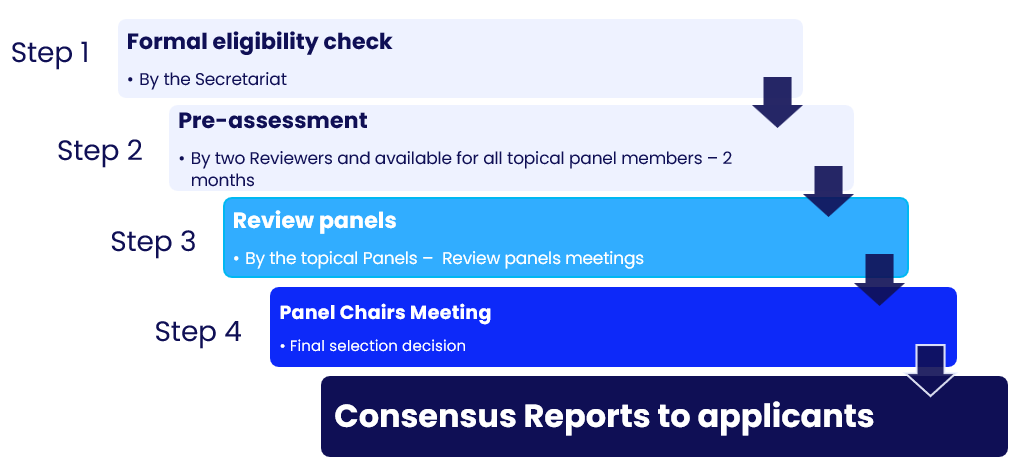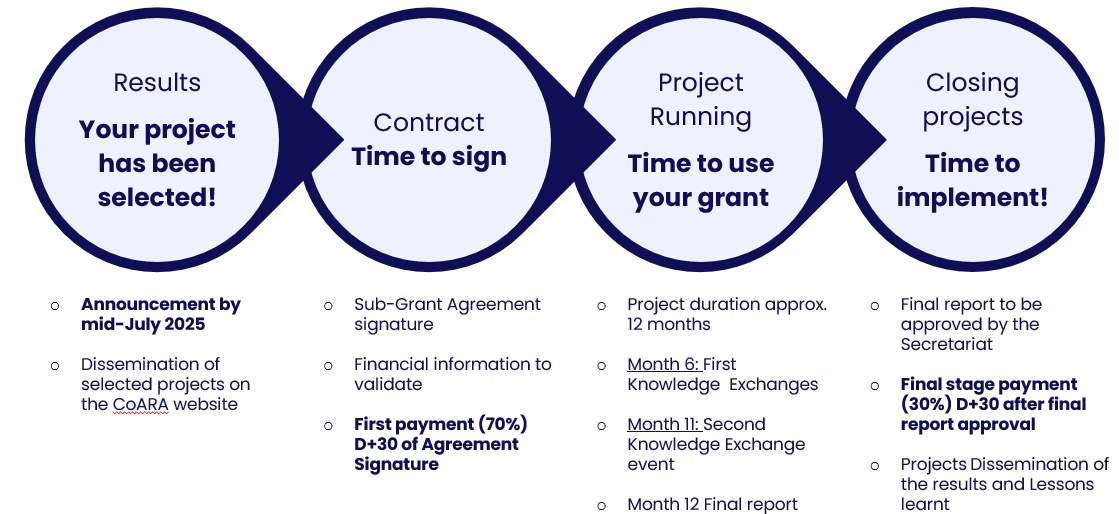FAQs on Cascade Funding
The cascade funding programme consists of two rounds of open calls, the First Call launched in April 2024 and the Second Call will open mid-February 2025. For any questions, please consults the FAQs below.


General Questions about CoARA Boost
The Horizon Europe CoARA Boost strengthens the operational capacity of CoARA. It provides a means to develop a critical mass for reforming research assessment, to generate gravitas for new members as well as to investigate and implement new models for research assessment. The project started in October 2023 and is 36 months long.
More information about CoARA Boost is available at: CoARA Boost Project – CoARA.
Two Calls are planned, the first one launched on 26 April 2024 and the second one to be launched in mid-February 2025. Both Calls stay open for 60 days.
Cascading grant mechanism will contribute to institutional changes to a significant number of organisations of different types and across geographical areas: at least 50 projects will be funded from a total budget of 2.33 million €.
With funding between €30,000 to €60,000 per project (lump sum, depending on the type of project), CoARA Boost can potentially cascade funding a maximum of 50 projects in total (25 projects were selected in the first round).
You can find the recording on the CoARA YouTube channel: https://www.youtube.com/watch?v=1hay9BD6Otw
The presentation materials from the webinar held on 3 June 2023 are available on the CoARA Zenodo repository: https://zenodo.org/records/11473966
The presentation materials from the webinar held on 30 January 2025 are available on the CoARA Zenodo repository: https://zenodo.org/records/14794738
General Questions about CoARA Boost Cascade Funding Call - Round 2
- Academies, learned societies that implement some form of research assessment;
- National/regional authorities or agencies that implement some form of research assessment;
- Public or private research funding organisations;
- Research centres, research infrastructures;
- Universities;
- Other relevant non-for-profit organisations that implement some form of research assessment.
The CoARA Secretariat will accept applications for the Second Call until the 23rd of April, 1700 CEST
The primary targets of the CoARA Boost Cascade Funding Programme are legal entities of the following types:
Applications from faculties of universities are also eligible; however, the university needs to formally be the applicant.
Please note that you should use the Faculty’s PIC (Participant Identification Code) rather than the University’s PIC if your Faculty has its own PIC number and the staff costs are calculated at the Faculty level.
Institutions that are not (or not yet) members of CoARA or not (or not yet) signatories of the ARRA are also eligible to apply.
As the call is meant to support institutions from across the European Research Area (ERA), only legal entities based in the EU Member States and countries associated to the Horizon Europe Framework Programme for Research and Innovation (see countires listed under the section “Third countries associated to Horizon Europe”) are eligible to apply.
Applicants must be institutions.
Faculty-level institutional pilot calls are possible but, in such cases, the institution needs to formally be the applicant.
Beneficiaries of the CoARA Boost project are not eligible to participate in the call.
In the case of beneficiaries that are umbrella organisations, their member organisations are eligible.
Nominating organisations of the CoARA Steering Board members are also eligible, as the Steering Board does not directly participate in the evaluation of the proposals. The Steering Board will not have any role in both the evaluation and selection of winning applications
Only legal entities can apply. The CoARA Boost cascade funding is not a funding schema designed for Working Groups and National Chapters. CoARA Working Groups are supported through Work Package 4 of the CoARA Boost project.
Individuals who are contributors or Co-Chairs of a Working Group or National Chapter are encouraged to apply in their organisational capacity and institutional affiliation.
Instead of Working Groups or National Chapters preparing joint applications in the capacity of the WG or NC, our recommendation is to implement or pilot their outputs(s) in the context of a specific organisation.
As part of the first call, three types of projects will be supported. These reflect different stages of an institution’s reform journey, namely:
1. knowledge exchange (teaming projects),
2. piloting (institutional pilot projects),
3. paving the way for a lasting change (institutional change projects).
Their description is provided in the Call text along with examples. See “Types of projects funded” on the First Call for Cascade Funding webpage.
Institutions may apply via the SmartSimple Platform.
More details are available in the guidelines for applicants in the Technical Guidelines document.
Sub-Grant Agreements have to be signed by the official signatory of your institution (e.g. the Rector, the Director, or the person legally competent to sign on behalf of the organisation) within one month of communicating the selection results.
Yes, institutional pilot projects and institutional change projects are mono-beneficiary and are to be conducted by a single organisation.
A maximum of three applicants can team up for Teaming Projects.
A budget must be assigned to each co-applicants of the project to avoid further cascading the grant. It means that all co-applicants will sign the Sub-Grant Agreement (Template Sub-Grant Agreement available here).
The budget for the Teaming Project will be shared between the co-applicants. Applicants enjoy full autonomy in deciding on details of budget distribution across partners.
This Call is designed to fund projects that are deeply anchored in the context of a specific institution. However, If the organisation is compliant with the eligibility type of organisation, namely the last type “Other relevant non-for-profit organisations that implement some form of research assessment“, and have a legal entity, then they can apply for instance as part of teaming projects. In such cases, applicants will have to specify how their contributions will concretely be implemented in a university.
Yes, as long as the organisations in question are non-commercial entities with a not-for-profit structure and have strong relevance to the reform of research assessment.
Hungarian entities can apply to this Call. For successfully evaluated applications if these measures set out in the Council Implementing Decision (EU) 2022/2506 are not lifted at the time of the decision on the grant award, the concerned Hungarian entities would be found ineligible to receive Union funding. For more information, please refer to the Funding and Tenders Portal FAQ on Council Implementing Decision (EU) 2022/2506.
The topic involves providing financial support to third parties by launching cascading grant’ call(s) to support institutions from across the ERA, notably those engaged in the coalition approach, to implement sustainable institutional changes to reform and improve research assessment criteria and processes.
Entities from Switzerland may benefit from financial support subject to the association agreement being applicable at the time of the award of the cascading grants. You may also refer to the Funding and Tenders Portal FAQ
Successful projects must begin no later than September 1st, 2025, and will run for one year (until August 31st, 2026 maximum).
Please note that no extensions are possible.
Questions on the Proposals and the Application Process
Proposals should be a maximum of 5 pages total (including figures, tables, charts, graphs, etc.).
See Annex 2: Application Template. Note that the font should be 11-point Arial for all the application and that you should not delete any instructions.
Successful applicants will implement research assessment reform efforts within their own institutions. Besides, successful applicants are expected to produce reports, a progress report on the implementation of their project and a final report on how institutional changes had been implemented and what are the lessons learned. They are also expected to participate in two knowledge-sharing events organised specifically for them.
Example activities are listed in the call text. Successful applications will be benchmarked against their work plans.
Technical, administrative, and professional services are welcome to submit a proposal provided that their activities and outputs are to be realised within the context of a specific institution.
Please note that by applying to this Call, you have to make sure that the leadership of the organisation or the academic staff in charge of reforming assessment processes have guaranteed and demonstrated the willingness to concur with that project or to commit to it in the longer term.
To ensure a rich and diverse pool of funded projects and organisations involved, successful applicants from the First Call cannot apply for the Second Call.
Additionally, a successful project selected in the First Call cannot be part of a Teaming Project (or any other project type) for the Second Call.
No, we accept only one application per institution.
Please note that institutions can submit only one application whether as a partner in a teaming project or as a mono-beneficiary (i.e. institutional pilot project and institutional change project)
And that, institutions can submit only one application regardless if the teams involved in the proposal change.
No, all submissions are final.
Questions Related to the Evaluation Process
- Alignment with the vision of the Agreement
- Expected impact and sustainability of the reform process, how it leads to institutional change
- Feasibility and quality of the proposed work plan and outcomes/deliverables within the indicated timeframe and proposed budget.
All applications will be assessed by a review panel composed of experts in research assessment, set up by the CoARA Secretariat. Review panels will assess applications submitted to the type of project that falls within their policy and/or research expertise.
See Annex 3: Evaluation Criteria and Scoring Sheet.
Three criteria:
The Evaluation process will be open from the 15th of April to the announcement of results by mid-July 2025.
For more details, please refer to the timeline below:

The panel members will produce a consensus report for each application, summarising the panel discussions. Narrative comments (not scores) from the consensus reports will be communicated to the applicants.
The main criteria is the applicability/impact within the applicant organisation itself; however, a broader application beyond the organisation is a plus.
Questions Related to Funding
- Teaming projects
- Institutional pilot projects
- Institutional change projects
- Project Budget Template – Unique Partner (Institutional Pilot Project or Institutional Change Project)
- Project Budget Template – Partnering Projects (Teaming Project)
The maximum grant amount depends on the type of Project you are applying for:
| Types of projects | Maximum grant amount | Maximum project duration |
|
|
40 k€ | 1 year |
|
|
30 k€ | 1 year |
|
|
60 k€ | 1 year |
Once your project is selected, your organisation will have a month to sign the Sub-Grant Agreement.
Please note that the Sub-Grant Agreement cannot be amended, the project timing and deadlines will be the same for all the selected projects.
After the signature of the Sub Grant Agreement by both Parties (ESF and successful applicants), the successful applicants will receive 70% of the total Project budget within a month.
The remaining budget will be distributed once the Final report has been validated by the Secretariat, within a month. More information on the Distributing budget can be found in the Sub-Grant Agreement (Article 5.2).
Grant management Timeline:

For the Teaming Projects, the 40k€ grant is the total maximum grant amount per project.
Each of the co-applicants will have to claim a proportion of that total budget.
The budget distribution between the co-applicants is to be defined within the application. Applicants enjoy full autonomy in deciding on details of budget distribution across partners.
Expenses related to staffing, events, exchange, and process development are all eligible, as long as none of them qualify as subcontracting.
It is not possible to co-fund CoARA Boost Cascade Funding proposals
Please note that indirect costs are optional and link to your organisation’s general practices in terms of indirect costs’ rates. They should represent a maximum of 25%.
See more details in the Use of Resources tables below:
Inclusive. If overhead costs are charged, they should be calculated as part of indirect costs.
Indirect costs are optional and link to your organisation’s general practices in terms of indirect costs’ rates. Please note that they should represent a maximum of 25%.
See more details in the Use of Resources tables below:
Subcontracting is strictly prohibited for core/essential tasks of the projects.
If the main tasks of your project are software development or video production, then outsourcing these costs is prohibited.
However, in case the applicant organisation also contributes with significant added value to the task, collaboration with 3rd party service providers is possible.
No co-financing is needed, only support from the executive level of the organisation and commitment for the uptake of the project outputs (to be indicated in the application and evantually by the ognature of the subgrant agreement by the legal representative of the applicant organisation.
Knowledge Exchanges are online events that are organised for the selected projects.
All successful applicants of the Cascade Funding calls will be invited in a first Knowledge Exchange event to explore synergies, to discuss possibly overreaching matters in order to help them in their implementation.
A second Knowledge Exchange will focus on the lessons learned.
Participation in both Knowledge Exchange events is expected as part of the milestones defined in the Sub-Grant Agreement.
Yes.
Indirect costs are optional and link to your organisation’s general practices in terms of indirect costs’ rates. Please note that they should represent a maximum of 25%.
See more details in the Use of Resources tables below:
Step 1: You have to pick the Excel budget template matching the type of project you are applying to:
Please note that no password is needed to fill-in the document.
Step 2: You have to fill-in the applicant tab (i.e. “individual template” or “partner template”). You do not have to fulfill the annoted template of the Excel budget – the purpose of this tab was to provide guidance to applicants to fill-in their own Excel tab.
Step 3: You have to sign your applicant tab. It should be a certified and timestamped one (e.g., using Adobe Acrobat, YouSign, or similar tools).